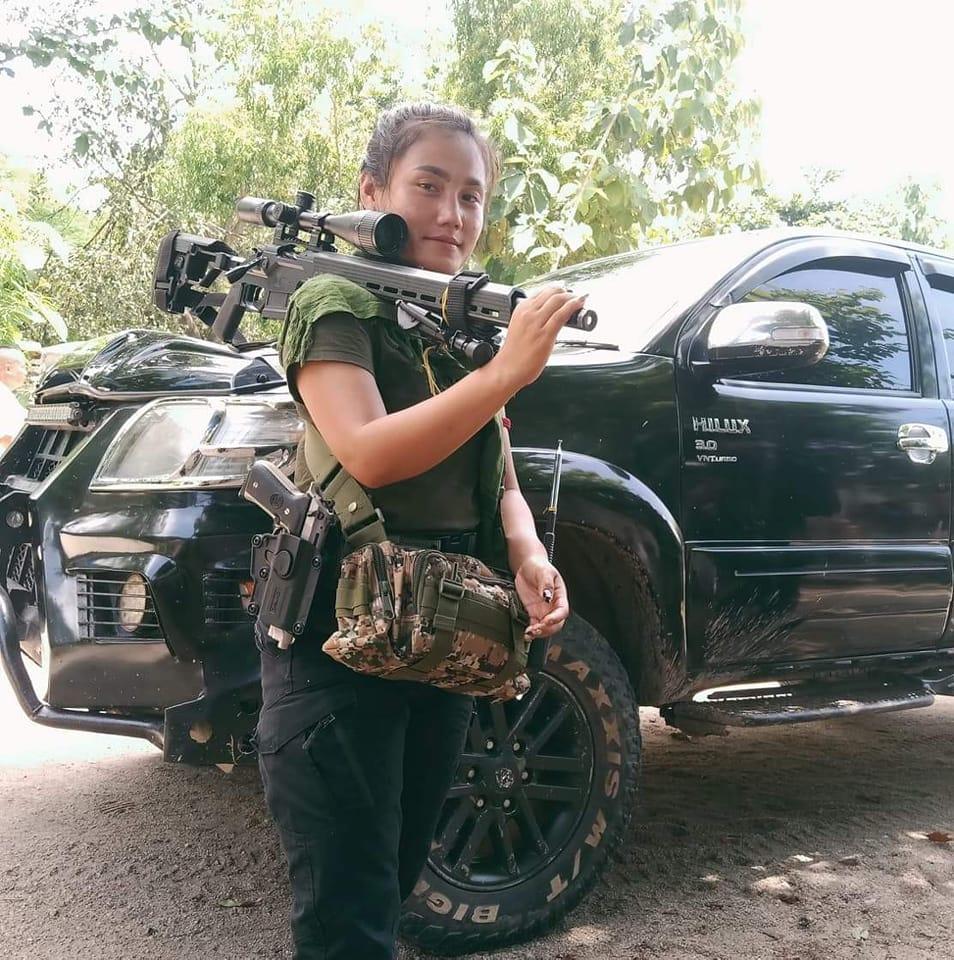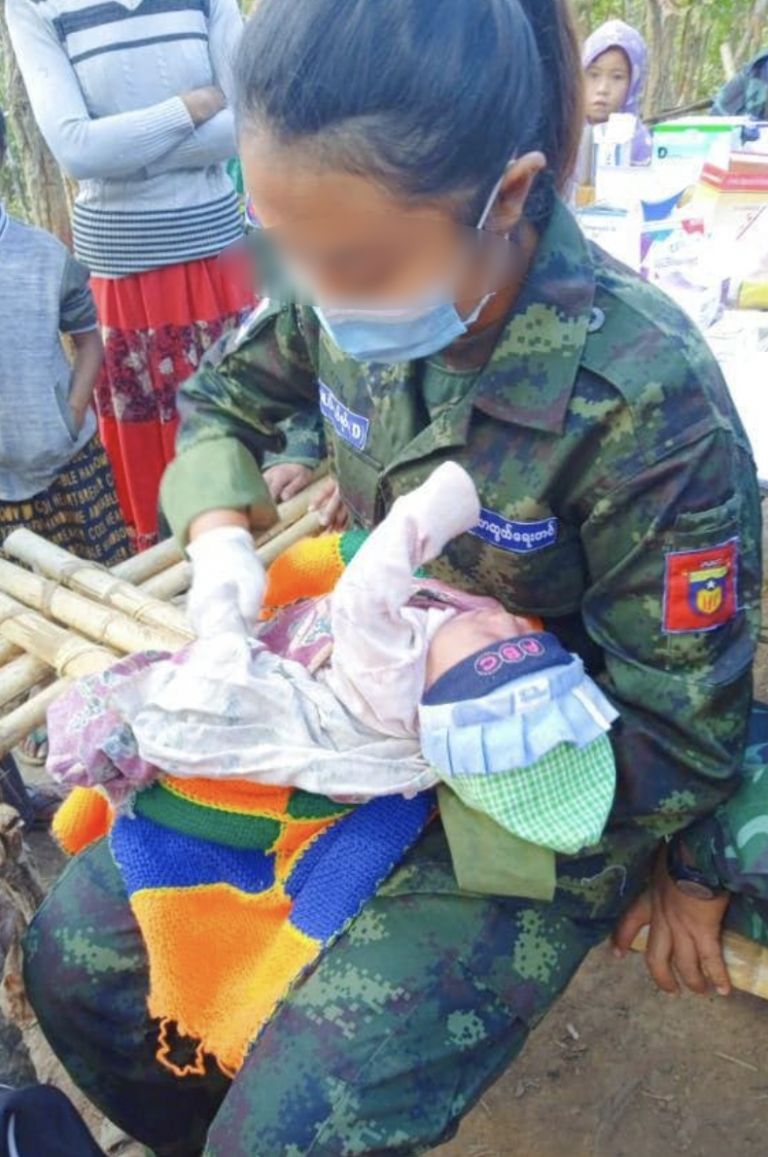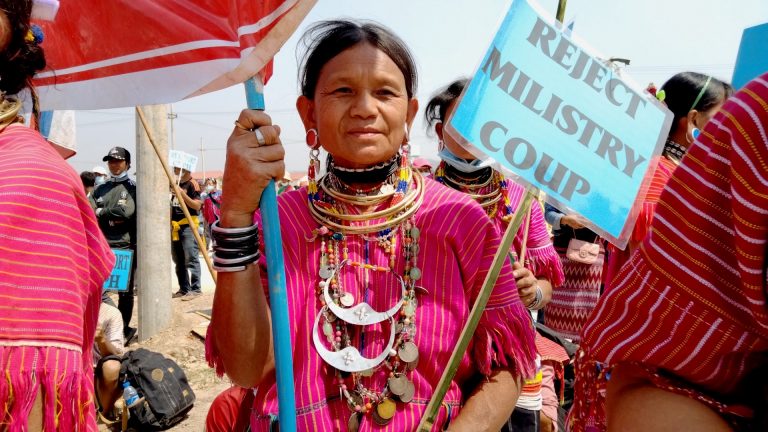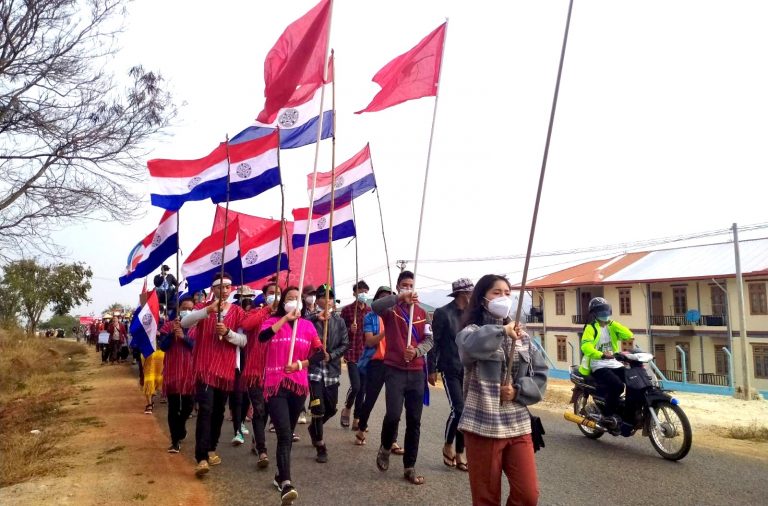The women fighting on the eastern frontline
MYAWADDY, KAREN STATE // In the afternoon, Naw Eh Moo, 28, was carrying rations in a vehicle to the frontline on the Myawaddy-Wal Lay highway when her logistics team was ambushed by Burmese army soldiers. The resistance fighter was killed alongside another young woman, Naw Lu Lu Phaw, 22, and a young man, Ko Kyaw Gyi, 20. They were part of the Cobra Column, also known as Battalion 27 of the Karen National Liberation Army, the armed wing of the Karen National Union (KNU), according to The Irrawaddy.
Naw Eh Moo’s team supplied Cobra troops with uniforms, equipment and medicines. She leaves a five-year old daughter behind and many friends in mourning.

Despite the risks, hundreds of women like Eh Moo choose to join resistance fighters’s groups after the coup, united in their outrage as well as their commitment to a democratic and non-discriminatory future for Myanmar. All-female forces have also sprung up, such as the Myuang Women Warriors (M2W) whose primary mode of resistance is creating and planting landmines that attack the junta’s troops in Sagaing Region. There are similar all-female units that are part of larger armed organisations like the Karenni Nationalities Defense Force (KNDF).
Sayama Chili is a 25-year-old midwife who provides medical services on both the frontlines and in refugee camps in Karenni state for the Demoso People’s Defense Force (DMO-PDF).
On the 8th day after the military coup, Sayama Chili began her participation in the Civil Disobedience Movement (CDM) and anti-coup demonstrations. Then, she was fired from her job. Three months after the coup, war and fighting started between Karenni Local Defense Forces and the junta’s army in Chili’s native town, Demoso. Chili and her family had to move to the nearby villages. They were away from the battles, but they were struggling for survival as war refugees.
Chili used to visit her family in a refugee camp in the western part of Demoso once every three months. Due to the difficulty of transportation, she can’t go there anymore and now stays in contact with them online. They are concerned about Chili and the limited contact they have with her. This concern is compounded by the fact that Chili is the youngest of her family members.
Under the leadership of the National Unity Government (NUG), which received most of the public support, armed forces were formed to counter the military junta’s forces. Among them, the DMO-PDF was the third group to be created in Karenni state. The battles in Karenni state are among the most intense in the country. The DMO-PDF was formed on May 6th, 2021, and has 11 units with 4500 soldiers, according to their one-year anniversary statement.
Currently, there are at least six groups who are fighting against the junta’s army in Karenni state. Chili chose to join DMO-PDF force because one of their units is based near her native home and she had close contact with its members. She is in charge of healthcare for them. Chili joined the DMO-PDF force on July 10th, 2021, to serve and support those in need of healthcare and first aid. As the battle between DMO-PDF and the junta’s army intensified there was an increasing demand for medical services. Chili is professionally trained to provide medical services.
"We demonstrated peacefully but the army killed the civilians. They arrest and torture people. And also on the frontlines of the battles, our soldiers need medical support and medics. That’s why I decided to join as a medic of the DMO-PDF force, to counterattack this way."
For over a year, finding and purchasing medicine has been dependent on both local and foreign donors. As the economy of Myanmar declined dramatically, people face hardships that make donations scarce. Those that do attempt to transport aid to them are in danger as volunteer’s cars carrying medicine and food for refugees were attacked by junta troops.
In March 2022, the military council banned all shipments of medicine and medical materials to Loikaw Town without their permission. Getting enough medicine and medical materials to DMO-PDF forces in war-affected areas is now very difficult. Chili said, “There are a lot of hardships. The most important thing is that sometimes we lack medicine that we used to be able to give to people. And also as long as I have been a CDM worker, it is difficult to go anywhere.” Currently, the diseases that Chili most commonly encounters in patients are measles, mumps, flu, diarrhea, diabetes, high blood pressure and injuries. If she doesn’t need to go to the frontline, she works as a healthcare professional in the PDF camps and the refugees camps. Sometimes, due to the lack of medicine, patients are unable to receive treatment from health services and are forced to go to other remote clinics.
“Last time, the malaria RDT test kits were gone and we had no more test kits for the suspected patients. So, we had to go to another camp, where there were enough kits to test them. I feel sorry for the patients who had to go to a place far away for medical care.” As of December 2022, more than 202,000 people were displaced and 286 people were killed in the state since the coup, according to Karenni Civil Society Network. Most of them are pregnant women, new born babies and elders. War refugees in Karenni State are dying not just because of battles, but also because their basic needs are not met, such as food and healthcare.
For the time being, Chili’s position is to be a frontline medic. She served on the battlefield seven times already, which is so risky because of the landmines scattered there. Every step she makes is dangerous and requires extreme caution. The most remarkable and memorable battle she experienced is when she followed troops as a medic to DawNgan Kha village, Demoso City, a day in August, 2021. “At that time we reached a little further beyond the patient’s location and went back to check with a motorbike. The patient was bleeding. I urgently needed to control the flow with a band-aid and I injected blood-stopping drugs. After that, I needed to wait and check the patient’s condition and symptoms. Then, I made a plan for treatment by stabilizing the pulse, breathing rate, etc. Then, I provided the medication. When the patient reached a stable condition, we took him away.”
Chili said that she is still afraid of the sound of heavy weapons exploding even though she often goes to the field between the battles. If there is no duty in the front lines, she helps in the clinic. She also goes to the refugee camps, where the patients have difficulty reaching hospitals or clinics. There are often pregnant women at these camps who are in need of help to give birth. Chili talked about her conviction that she will be part of the revolution when it succeeds. Only after that will she continue to work on her dream career in healthcare.
Chili has hope and expectations that the NUG will achieve equal rights for women without discrimination after the revolution “We women of Myanmar are brainwashed by old traditions and cultures. We can’t liberate ourselves from those old ways and concepts of being women. We are being oppressed without knowing how we are oppressed because we are born and traditionally trained under these cultures. But nowadays, our eyes are opened and we see the discrimination against women in our cultures and traditions. So, there is a bit of awareness about the oppression of women nowadays.”
I want every woman to see and notice the rights she is owed as it is our birthright. We should erase every single wrong concept of tradition and culture which discriminates and separates between male and female."
Chili said that currently the participation of women in the revolution is increasing, and is higher than in the previous revolutions. Therefore, she is encouraged and motivated by the idea that women have an important role in this revolution.
A version of this article was published in French as part as a series of investigative features for our partner outlet Mediapart, ‘Chroniques d’une Birmanie en résistance’



